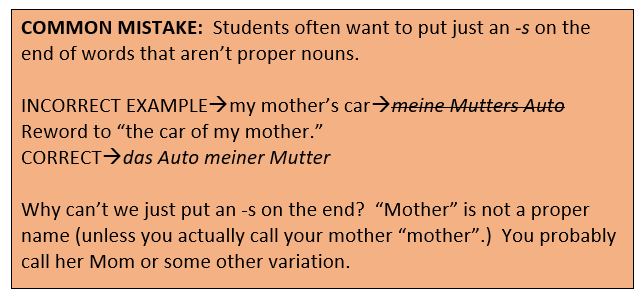19 Section 6-1: Genitive Case
6-1: Genitive Case
So far, you have learned three cases: the nominative, accusative, and dative cases. The last case in German is the genitive case.
The genitive case shows possession. Here is what you have already learned about the genitive case in Chapter 1.
→Add an –s to the end of a proper name to show possession.
- Michaels Buch
- Alexanders Sofa
- Papas Anwalt
- Tolkiens Herr der Ringe
NEU!! The genitive case can also be used for things other than proper names. Here are a few examples.
- das Ende des Tages (the end of the day)
- die Cousinen unserer Mutter (the cousins of our mother/our mother’s cousins)
- der Anfang des Semesters (the beginning of the semester)
- viele Probleme der Studenten (many problems of the students/the students’ many problems)
Since the English translation of these genitive phrases has “of” in it, we can think of the genitive case as the “of the” case.
HOW TO FORM THE GENITIVE CASE:
Masculine/neuter add –s. (This will always be the 2nd noun in the phrase.)
- der Mitbewohner meines Cousins (the roommate of my cousin/my cousin’s roommate)
- das Auto des Professors (the car of the professor/the professor’s car)
- das neue Buch des Autors (the author’s new book/the new book of the author)
→Notice that the noun in the genitive case ALSO adds an –s at the end of the word. This will ONLY happen in the masculine and neuter forms.
→If the masculine or neuter word has only one syllable, it often adds an –es to the end of the word.
- das Ende des Tages (Tag has one syllable; therefore we add –es.)
- der Name des Kindes (Kind has one syllable; add –es.)
→HOWEVER, since the past 20-30 years or so, the language seems to be evolving so that the extra syllable is dropped. One often hears such examples with only the –s at the end.
- das Ende des Tags
- die Spielzeuge des Kinds
Watch this clip from the classic Sailor Moon anime to hear an example of the genitive case with the –es ending: “im Namen des Mondes”
Feminine/plural add –r.
- die Mutter meiner Nachbarin (the mother of my neighbor/my neighbor’s mother)
- andere Aktivitäten der Leute (other activities of the people/the people’s other activities)
- das Zimmer seiner Schwester (the room of his sister/his sister’s room)


Click to watch me reteaching the genitive case with several videos:
To see even more examples, watch these videos:
Q & A with the Genitive Case:
Q: How do I know when to add –s or –es to the end of the word.
A: If it’s masculine or neuter and has only 1 syllable, add -es. If it is masculine or neuter and has more than one syllable, add only –s.
Q: What if it’s a proper name?
A: Put an -s at the end. Sophie→Sophies Buch

Watch YourGermanTeacher’s video to see more on when to add -s or -es:
To do another activity like Ex. A, go to Germanzone.org’s website.
For help with Ex. B, watch this video. Disregard the page numbers. They come from a different book.
For help with Ex. C, watch this video. Disregard the page numbers. They are from a different textbook.
Deutsche Musik. Listen to Nena’s song Land der Elefanten, 1984, to see lots of examples of the genitive case. You will also see an example of n-nouns in the genitive case.
Lyrics: https://genius.com/Nena-das-land-der-elefanten-lyrics
Song:
The Death of the Genitive Case??????!!!!
Der Genitiv stirbt langsam aus.![]()

There are rumors that the genitive case will die out in the next 50 years because the dative case often replaces it.
- Das ist ein Freund von meinem Bruder.
- Das ist eine Cousine von mir.
- Das ist der Anzug von meinem Mitbewohner.
Will in disappear completely before we die? Who knows? However, in colloquial German, many people prefer to use von + dative instead of the genitive to show possession. (In the past 20-30 years this has become even more common.)

Click to watch me reteaching how the genitive case can be replaced by von + dative:
TRIVIA with the Genitive Case!!!
EXTRA PRACTICE: Go to Germanzone.org’s website to do extra practice with the genitive case.
- https://www.germanzone.org/genitive-case-possession-relationships-1/
- https://www.germanzone.org/genitive-case-possession-relationships-2/
- https://www.germanzone.org/genitive-case-possession-relationships-3/
- https://www.germanzone.org/genitive-case-possession-relationships-4/
Ex. E: Nicos Weg. Episode 63: Meine Tante. Watch the episode and do the online activities. You will review possessive adjectives and job vocabulary.

https://learngerman.dw.com/en/meine-tante/l-37664498
Ex. F: Nicos Weg. Episode 64: Mein Bruder. Watch the episode and do the online activities. You will review possessive adjectives, which you learned in Chapter 1. You will also review the modal verbs sollen and müssen, which you learned in Chapter 3.

https://learngerman.dw.com/en/mein-bruder/l-37664164
Watch Easy German’s video to see lots of examples of the genitive case:

